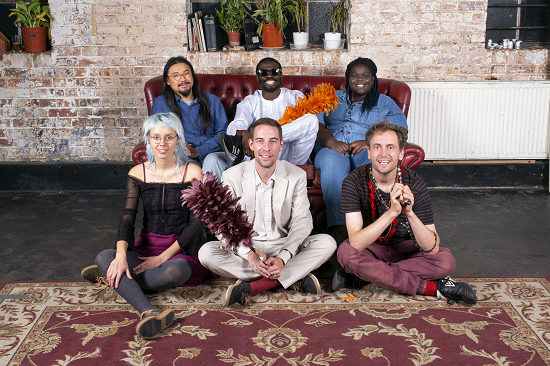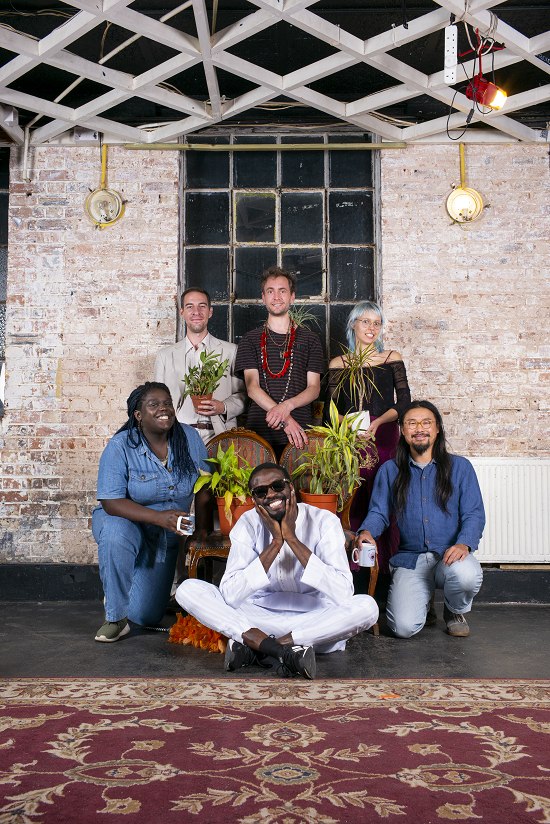As Alabaster DePlume joins the Skype call, he and Joshua Idehen start grinning, dancing and making a trumpeting noise as they greet one another, like two schoolboys crossing paths in the playground on the first day back after the holidays. “This is the first time I’ve seen this guy this year!” says a beaming Idehen, who has been locked down in Stockholm for the last few months. The two make music together in a magical band called Calabashed. They are a charismatic pairing, Idehen prone to frantic flights of fancy and DePlume to extended periods of deep contemplation.
They are full of compliments for one another. “You don’t know it,” DePlume tells Idehen, “but the experience of having a chat with you, you come away from it with a warmth and a childish playfulness.” Later, Idehen is breathless with praise for DePlume’s collaboration with Soccer96 – the modular synth and drums duo of The Comet Is Coming’s Danalogue and Betamax – ‘I Was Gonna Fight Fascism’. “The repetition, the simplicity, the call and response nature of it, the punchlines, it manages to capture that cynical, nose down feeling, but it’s also accessible and all-welcoming. Everyone from a child to a cynical-ass man like myself can get into. That’s such a strength!”
They first met in 2017, after Stephen Bass of the label Moshi Moshi took DePlume to see a show by Idehen’s group Benin City in Hackney. DePlume wanted to enlist Idehen to take part in one of his ‘Peach’ shows, a semi-improvised night at the Total Refreshment Centre in Dalston with an ever-shifting cast of players, and approached him after the gig. “Your vibe was like, ‘OK, whatever!’” he remembers with a laugh. “I was like, ‘I’ve definitely got to get him, he doesn’t give a shit!’ It felt good to be treated like that, you were genuine.” “At that time,” Idehen points out, “I hadn’t heard you performing. I think on that particular day I was like ‘Oh OK, you see me perform at a gig and now you want to book me for cheap. Whatever.’”
Not long afterwards, Idehen came down to the May 17, 2017 edition of Peach (his bandmate can recall the exact date because he’s kept the flyer). It was after seeing DePlume perform that his perspective changed. “Peach was done with the crowd in a circle, which I thought was such a great thing,” Idehen remembers. “Alabaster was performing a half-jam built around the songs he was making at the time. I was already listening, thinking ‘this is great music’, but then you played ‘Did You Ever Hear About The Mau Mau’. In eight years of making music, that was the first time I genuinely felt like ‘I’m going to storm this man’s stage and perform’ because I liked the music so much. I told him afterwards, ‘It took all of me to stay sat down.’” Such a stage invasion would probably have been in keeping with DePlume’s free-spirited approach to gigs, “But I was like no. We need to work. We need to do something properly.”
DePlume started sending demos for Idehen to pen words for, but the vocalist found himself with writer’s block. “It would take me six months to send over the lyrics. I liked the music so much that I became panicky and completely froze,” he recalls. To counter it, he referred to Aesop’s Fables, one of his enduring literary influences. “The idea was to look at each fable and burn it down to its core theme. Something like treachery, treason, jealousy or strength or stupidity.
“I love Aesop’s Fables,” he continues. “I’ve got several different versions of them on apps or as hard copies. To me they’re like a children’s version of Shakespeare, they take these decades-spanning stories and burn them down into a three act play. ‘True love is lost’, ‘If you lie you’ll lose your hand’, ‘Don’t argue with a bad person because a bad person will look for any reason to be bad.’ I see a potency in that.”

At the time he was writing the first Calabashed songs, Idehen had just been through a divorce, a relocation, and “the splintering of what I’d called my friendship circle,” and as well as Aesop’s illustrations of depression he drew upon his own trauma for one of the first songs, ‘Ode To Jazzman John Clarke’. The track is a marvel, beginning with a breathy, wordless vocal line over heavenly flourishes of harp before Idehen’s vocals appear slowly and subtly, raising gradually in power until they become overwhelming. He recounts losing his head, the shadows running across his bed, and the time he considered stepping in front of a train. The song is vulnerable and raw, but also purge-like and triumphant. “I wear my pain as a jacket!” Idehen howls, a reference to the titular jazzman’s poem ‘I Wear My Soul As A Jacket’. “I’m alive, and for that I give thanks!”.
“That was me trying to exorcise a lot of the things that had happened to me, and my own toxicity as well” the vocalist says. “I sent it off to Alabaster and I remember I said ‘hey, I know it’s been three months since we said we were going to do this, but I’ve finally written a song. If you think it’s terrible I completely understand, let’s just never speak to each other again,’ but then Alabaster was like ‘No Josh, this is the most amazing thing I’ve ever heard, send more.”
DePlume pauses a moment. “Well, it was an honour to have that vulnerability,” he says sincerely. “I don’t work much as an accompanist these days, I make my own things, and there aren’t many situations where I’m going to be like ‘yes, let me make some music to support someone else’s words.’ I’ve kind of made it a thing not to do that. But this is the one occasion where I’m up for making that a priority. It was a humbling thing to be involved with someone finding the courage to put that into creative work. I’ve seen him do things like bring great work and contribute it to other people’s stuff, and I wanted to give something to his voice. There’s a rich truth that’s a little bit scary in what his voice carries.”
DePlume had organised another Peach show, and wanted Idehen to perform ‘Ode To Jazzman John Clarke’, but the latter, still low on confidence after his annus horribilis, was reluctant. “Life was in slow motion, I had just gone through so much that year it had burrowed in, over and over. Alabaster had got all these musicians to come together to perform, and I’m watching all these people and I’m thinking ‘So it’s just Josh who’s the shit one!’ I was sweating buckets, but when it started I just let loose. It felt welcoming and reassuring. Alabaster is very in tune with all the people around them, he’s very happy to lean back and instinctively know when to come in. I found halfway through my performance, I understood. ‘I’m working with someone who’s actually listening to me!’”
The Total Refreshment Centre lost its license to host public gigs last year, but remains the base for DePlume and a number of other creatives. For Calabashed it was not just the site of those two formative Peach nights, but a location whose creative spirit lies at the band’s core. “The fact that Joshua and I are working together in the first place comes from things that would never have happened the same way anywhere else,” DePlume says. “The fact I’m doing any of this work at all comes from this place and the way that people are here in this community.” Many of the musicians who would join Calabashed as they recorded their debut EP Behold A Black Wave were sourced from DePlume’s previous creative ventures there. “The way they work with each other belongs to this space,” he continues, “the sound belongs to this place because of the studio here. I could get away with getting the recording sessions to happen the way I like to make recording sessions happen.” He recalls laying down the beat that would eventually become the EP’s ferocious closer ‘Take It Outside’, on which Idehen paints a grizzly and chaotic picture of political tension and toxic masculinity, during an all-night drinking and studio session, during a til-dawn drinking and studio session with Dan ‘Danologue’ Leavers.
“It’s been a place that my creativity has value,” says Idehen. “It’s a place where I, my words, my thinking and my potential have weight, and I think that’s because a lot of the people who exist there and work there create not only a space for themselves to be creative but spaces for other people to be creative and find their potential and their worth.” DePlume cannot contain an enthusiastic ‘yeah!’.
Calabashed’s line-up would eventually consist of Donna Thompson on whistling and backing vocals Maria Osuchowska on harp and James Howard on guitar, all of whom are regular players with DePlume, as well as Raimund Wong who gets what Idehen calls “weird ethereal sonic noises” from a a cassette tape, and who also does the graphic design for all of DePlume’s album covers, gig posters and t shirts. Fellow Total Refreshment Centre residents Leavers and Capitol K produced and mixed the record, respectively. With Idehen a remarkable presence as lead vocalist, and DePlume as chief composer and coordinator as well as saxophonist, the noise they make is remarkable, full of glistening flourishes and almighty swells, plunging darkness and soaring light.
As they continue to work on their debut album, the rest of the band have started contributing compositions of their own, while the killing of George Floyd in May has provoked Idehen to intensify the political side of his writing. He’s also incessantly trying to get DePlume, whose writing skills he lauds at every opportunity, to contribute words of his own to the album. Many extraordinary projects have come out of the Total Refreshment Centre’s sprawling network of performers, but few if any quite encapsulate its philosophy of creative encouragement, and articulate the immense power of vulnerability, quite so much as Calabashed.
Calabashed’s EP Behold A Black Wave is out now via Purple City


